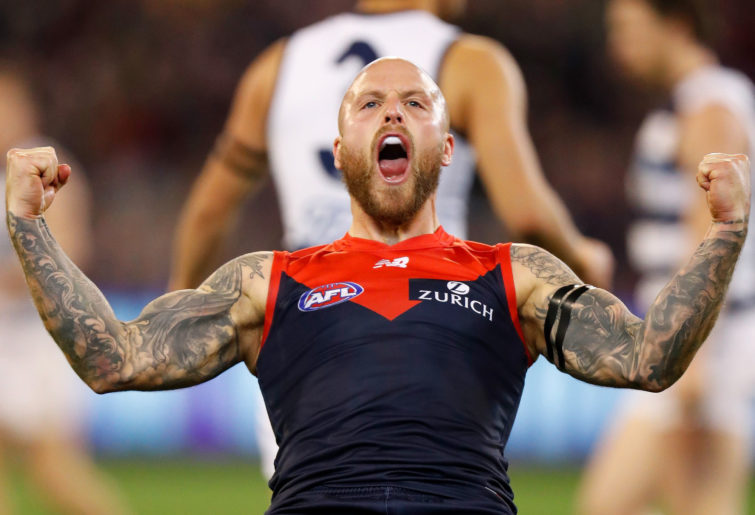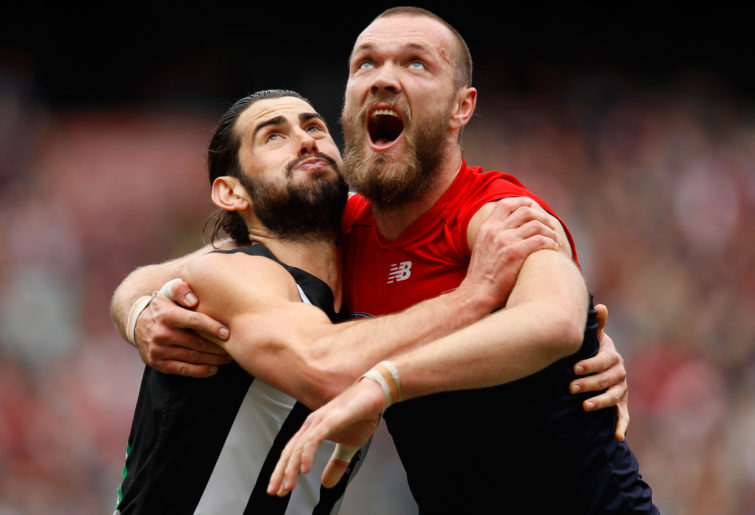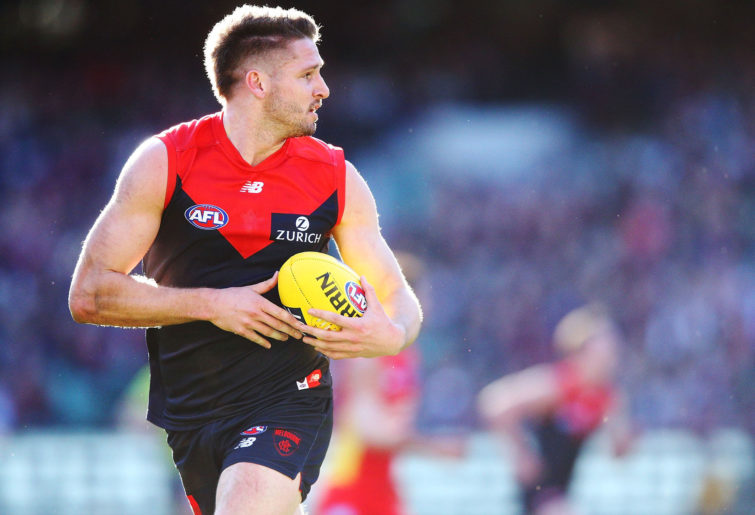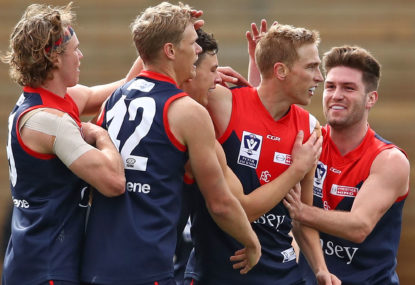With the home-and-away season, the finals series and the trade period all completed, it’s time to do not only a review of each club’s 2018 season (complete with expectation comparisons), but the likelihoods and expectations for the coming 2019 campaign.
This is the 11th of 19th articles looking at the meta-results for both team and players, as collected from ELO-Following Football’s wide range of sources.
Presenting, the Melbourne Demons.
Back in 2017
The team finished a very frustrating ninth place with a home-and-away record of 12-10 with a percentage of 105.2%, seven points (not “percentage points” – ACTUAL POINTS) and a mere 0.4826% behind West Coast. (Had Collingwood’s last goal in Melbourne’s R23 game been a behind, and Bernie Vince’s last behind been a goal, that alone would have made up the gap.)
So it seems extremely appropriate that it was against the Eagles that the red-and-blue broke the hoodoo in R22 this year, after what West Coast was able to manage on the Sunday after a Demon choke job the day before left the door open for the Eagles to upset the first-place Crows and sneak into finals at 105.7%. Revenge is always a strong motivation.
The expectations for the team…
Were that they would finally achieve their 12-year dream of returning to finals. The consensus was seventh place, with the range from fourth to eighth and the occasional lack-of-faith out-of-finals guess. (This one ended up being pretty accurate.)
Coming into the season, the players who were considered to be in the top 50 in the league by the AFLPA and/or The Roar included Max Gawn (top forty), Clayton Oliver (top forty), Nathan Jones and Jack Viney.
In 2018
The team finished with 14 wins, including that dramatic one in Perth against those same Eagles, which helped Melbourne finish in fifth place with a strong 131% percentage. They roared through two playoff veterans, Geelong and Hawthorn, and then…splat. The preliminary final they played against West Coast will live in their memory all summer long.
It’s been six years since that two-win season in 2013 which prompted calls for league assistance. Since then, they’ve won four, seven, 10, 12, and now 14 games in consecutive seasons. I don’t know if five straight improvements is a record or not, but it’s pretty darn impressive.
It’s been 13 seasons now since their previous finals appearance, something Demons fans no longer have to keep track of.
It’s been 55 seasons since the last Demon title, in 1964, the last of a string of 11 years in which Melbourne finished first seven times, won six titles, made the GF eight times, and was never out of the top four. They averaged close to 14 wins a season for over a decade.
According to our patented “ELO-Following Football” rating system, the team started the season at 50.7 (tied for eighth), fell to 45.7 after R5, and then figured it out, leaping to 80.4 after R10. There were only three “circuit-breaker” games that moved teams ten or more points in one game – and Melbourne had two of them in back-to-back games in Round 8-9.
Then, they fell back to 70 by the bye, but two upsets of top eight teams had them edging above the premiers at 75 in second place at the end of the regular season. The first two September wins moved them to the top of the ratings ladder at 81.2 before their singular collapse brought them to an end at 72.2, in third place over the summer hiatus.
The other rating systems
The three-week span in Rounds 8-9-10, where the Demons leaped 28 points in the ELO-FF ratings, had varying effects on the other systems, but it brought them out of mediocrity in all of them. The Arc, for example, moved Melbourne from 10th to 4th in those three weeks, cutting the gap to Richmond in half. They’re currently top five in every system.

(Photo by Michael Willson/AFL Media/Getty Images)
Across the spectrum game-by-game expectations
Final record: 14-8. It’s conceivable that given the numbers you’re about to see that they still underachieved this season.
Betting Line expectations: 15-6-1. The Demons were also 15-7 against the spread this season, the best mark in the league.
ELO-Following Football forecasts: 17-5.
AFL.com.au game predictions: Also 17-5.
The Roar predictions: 16.5 – 5.5. The individual picks were an astounding 92-29.
“Pick-A-Winner” predictions: 14-8.
The Age forecasters: 18-4, with individual picks totalling 216-48. Both are second only to Richmond.
BetEasy “CrowdBet” percentages) The “crowd”, on the other hand, had Melbourne predicted to go just 12-10 this year; individual game percentages totalled to 1326% for, 874% against.
My own game-by-game predictions pegged them at 18-4, although one of those four was the game in Perth in Round 22.
What was their best game of the season?
It’s hard to surpass the raw emotional impact of their upset victory in Perth in Round 22, when they exorcised the daemons *pun intended* of not only the previous year’s failure at the claws of the Eagles, but twelve long years of frustration.
They had several other games during the year, however, that are deserving of a rewind when Melbourne fans think about their 2018 season: Rounds 8-9-10, where they beat a Suns team we still thought might be decent by 69, a Carlton team that…well, a Carlton team by 109, and a Crows team that was still decent in Alice Springs by 91.
And after going the first 21 rounds without defeating a single finals-bound team, they won four straight games over finalists in R22-25, besting not only West Coast but following that up with dominating wins over GWS, Geelong, and Hawthorn in succession.
Which game would they most like to erase from memory?
The easy target is that prelim final loss by 66 points to the Eagles, in which they failed to find the big posts for the entire first half.
But they had a few during the home-and-away that would best slip from the data banks if they had their way:
Back in Round 1, superstar Max Gawn pulled a set shot wide that would have won their opener against Geelong.
Hawthorn annihilated the Demons in Round 4, holding them to one goal over the last three periods and winning by 67 points.
In their quest the next week to prove themselves against the reigning premiers, they merely showed they had a long way to go, as Richmond pulled away in the fourth (as they were wont to do this season) and won by 46.
That three-game losing streak in June included a loss to St. Kilda – Saint Kilda! – and a rout at Collingwood’s hands as well.
Zach Tuohy’s after-the-siren goal in R18 and Sydney’s upset in R21 on the Demons’ home turf seemed to be daggers in the finals bids of a team desperate to erase a history of failure…until the fabled win at Optus Stadium on 18 August!
Bottom line, if we were to speak of the club in as many words as they had wins in 2018: “When the Demons were good, they were great – but when they were bad, they were traumatic!”
Meta-player of the year results
Over the course of the season, we gathered game-by-game naming of the outstanding players of the game or the week from 14 different sources. These range from “Team of the Week” listings to more Brownlow-like top player of the game scenarios. Our tallies are from external sources, while the team’s “Best and Fairest” was selected by the team’s coaches, so they never quite match up. But it’s still an interesting comparison.
Regarding “Dominant”, “Prominent”, and “Notable” performances, those terms indicate games where 90%, 80%, or 70% of those fourteen sources recognized the player as outstanding in that week’s game. (This is the most “Brownlow-ish” we can get during the year.)
1. Max Gawn – 518 points (ELO-Following Football’s Meta-player of the year)
Best and Fairest finish: First – his first such award. Also finished equal fourth in finals points. Received 21 votes for the Brownlow Medal, fourth place overall and highest for a ruckman in several years, yet only second on the team in 2018.
Last year’s meta-PotY finish: Ninth (#128 overall), but was first in 2016 (and fifth overall).

(Photo by Michael Willson/AFL Media/Getty Images)
Dom/Prom/Notable games: Two dominant games (in R17 and R23), and 10 prominent games (deep breath: Round 1, Round 3, Round 6-9 consecutively, Round 15-16, Round 19, and Round 22). That means Gawn attracted the plaudits of 80% or more of professional observers in over half of his 22 games.
All-Australian Ruckman. ELO-FF Top 22 and First Team Ruckman.
2. Clayton Oliver – 454 points (7th overall) Finished third in points on the club during finals.
Best and Fairest finish: Second. Received 13 Brownlow votes, third on the club.
Last year’s meta-PotY finish: First (19th overall).
Dom/Prom/Notable games: Three dominant games (Round 7, Round 16, and Round 18), three prominent games (Round 2, Round 17, and Round 20), and three notable games (in Round 8, Round 11, and Round 19). Five consecutive games of 70%+ in Round 16-20!
All-Australian interchange midfielder, ELO-FF Top 22, first team Midfielder.
3. Jesse Hogan – 249 points (36th overall)
Best and Fairest finish: not in top ten, as unbelievable as that sounds from the outside. He did receive five Brownlow votes, fifth on the team.
Last year’s meta-PotY finish: 13th (184th overall). Fifth in 2016.
Dom/Prom/Notable games: One dominant (R11), five prominent (Round 2, Round 3, Round 7, Round 10 and Round 20), and one notable game (Round 17).
4. Angus Brayshaw – 203 points (53rd overall)
Best and Fairest finish: Sixth. Yet to the surprise of everybody, including Brayshaw himself who didn’t attend, he received 21 Brownlow votes, most on the club and third most in the league!
Last year’s meta-PotY finish: 24th.
Dom/Prom/Notable games: One dominant game (R10), one prominent game (R17) and three notable games (R16, R20, and R21). Yet he received either two or three Brownlow votes in R7, 10, 11, 15, 16, 20, 22, and 23! Amazing…
5. Tom McDonald – 188 points (62nd overall) Second in finals points earned.
Best and Fairest finish: Fifth.
Last year’s meta-PotY finish: Fourth (71st overall), and third in 2016.
Dom/Prom/Notable games: Four, all in a five-game stretch midseason – two dominant (Round 8 and Round 11) and two prominent (Round 9 and Round 12).
6. James Harmes – 128 points (90th overall). Equal fourth in points during finals.
Best and Fairest finish: Third.
Last year’s meta-PotY finish: 21st.
Dom/Prom/Notable games: Three notable games (Round 8, Round 22, and Round 23). His last five games were remarkably strong.
7. Jake Melksham – 111 points (102nd overall)
Best and Fairest finish: Seventh.
Last year’s meta-PotY finish: 22nd.
Dom/Prom/Notable games: One dominant game, in Round 9.
8. Nathan Jones – 102 points (116th overall)
Best and Fairest finish: Fourth. Also fourth in Brownlow votes on the team, with seven.
Last year’s meta-PotY finish: Third (67th overall), and seventh in 2016.
Dom/Prom/Notable games:
9. Christian Petracca – 82 points (155th overall)
Best and Fairest finish: not in the top ten.
Last year’s meta-PotY finish: Sixth (79th overall).
Dom/Prom/Notable games: none
10. Christian Salem – 77 points (172nd overall)
Best and Fairest finish: Eighth.
Last year’s meta-PotY finish: 12th (159th overall).
Dom/Prom/Notable games: One notable game, in Round 20.
Melbourne had six top 100 players and 12 top 200 players in the 2018 ELO-FF meta-rankings. Averages would be 5½ and 11, respectively.
Honorable Mentions
Jeff Garlett – 14th place (52 points) – one prominent game, in Round 2.
Neville Jetta – 11th place (75 points) – ninth on the team in Best and Fairest voting, plus voted Community Man of the Year for the Demons. Also had one prominent game, in R11.
Jordan Lewis – 13th place (58 points) – tenth on the team in Best and Fairest voting.
Jack Viney – 12th place (69 points) – First on the club in finals points accumulated. One dominant game, in Round 14.
Player movement during the trade period
In: Kade Kolodjashnij (from GC), Steven May (from GC), Braydon Preuss (from NM).
Gone: Jesse Hogan, Dean Kent, Dom Tyson.

(Photo by Michael Dodge/Getty Images)
Current list of draft picks: #23, 28, 54, 62, 91.
2019 Roster Highlights
Defencemen: Sam Frost, Michael Hibbard, Neville Jetta, Jake Lever, Steven May, Oscar McDonald, Christian Salem, Joel Smith, Josh Wagner.
Midfielders: Bailey Fritsch, Angus Brayshaw, James Harmes, Kade Kolodjashnij, Nathan Jones, Jordan Lewis, Clayton Oliver, Billy Stretch, Jack Viney.
In the ruck: Max Gawn, Braydon Preuss.
Forwards: Jeff Garlett, Mitch Hannan, Tom McDonald, Jake Melksham, Alex Neal-Bullen, Christian Petracca, Charlie Spargo, Sam Weideman.
Forecast for the 2019 Melbourne Demons
Hogan got them through the hard times, and it was hard to see him cast off like he was. Preuss is better than he’s given credit for, and May might be better in a more positive environment for him, but they’ll need to depend on what-brung-‘m-here if they want another shot at the Grand Final this season.
After a big jump this year, they should solidify their 5th place position from 2018, and then knock Hawthorn out en route to another shot at the grand final.
































































































